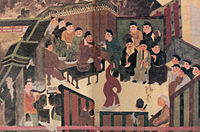Portal:Poetry
Welcome to the Poetry Portal


Poetry (a term derived from the Greek word poiesis, "making"), also called verse, is a form of literature that uses aesthetic and often rhythmic qualities of language − such as phonaesthetics, sound symbolism, and metre − to evoke meanings in addition to, or in place of, a prosaic ostensible meaning. A poem is a literary composition, written by a poet, using this principle.
Poetry has a long and varied history, evolving differentially across the globe. It dates back at least to prehistoric times with hunting poetry in Africa and to panegyric and elegiac court poetry of the empires of the Nile, Niger, and Volta River valleys. Some of the earliest written poetry in Africa occurs among the Pyramid Texts written during the 25th century BCE. The earliest surviving Western Asian epic poem, the Epic of Gilgamesh, was written in the Sumerian language.
Early poems in the Eurasian continent evolved from folk songs such as the Chinese Shijing as well as from religious hymns (the Sanskrit Rigveda, the Zoroastrian Gathas, the Hurrian songs, and the Hebrew Psalms); or from a need to retell oral epics, as with the Egyptian Story of Sinuhe, Indian epic poetry, and the Homeric epics, the Iliad and the Odyssey. (Full article...)
Selected article

Fu (Chinese: 賦), variously translated as rhapsody or poetic exposition, is a form of Chinese rhymed prose that was the dominant literary form during the Han dynasty. Fu are poetic pieces in which an object, feeling, or subject is described and rhapsodized in exhaustive detail and from as many angles as possible. Classical fu composers attempted to use as wide a vocabulary as they could, and often included great numbers of rare and archaic terms in their compositions. Fu poems employ alternating rhyme and prose, varying line length, close alliteration, onomatopoeia, loose parallelism, and extensive cataloging of their topics.
Unlike the songs of the Classic of Poetry (Shijing) or the Verses of Chu (Chu ci), fu were meant to be recited aloud or chanted but not sung. The fu genre came into being around the 2nd and 3rd centuries BC and continued to be regularly used into the Song dynasty. Fu were used as grand praises for the imperial courts, palaces, and cities, but were also used to write "fu on things", in which any place, object, or feeling was rhapsodized in exhaustive detail. The largest collections of historical fu are the Selections of Refined Literature (Wen xuan), the Book of Han (Han shu), the New Songs from the Jade Terrace (Yutai xinyong), and official dynastic histories.
There is no counterpart or similar form to the fu genre in Western literature. During a large part of the twentieth century, fu poetry was harshly criticized by Chinese scholars as excessively ornate, lacking in real emotion, and ambiguous in its moral messages. Because of these historical associations, scholarship on fu poetry in China almost ceased entirely between 1949 and the end of the Cultural Revolution in 1976. Since then, study of fu has gradually returned to its previous level. (Full article...)
Selected image
Poetry WikiProject

Selected biography

Yeats was a very good friend of American expatriate poet and Bollingen Prize laureate Ezra Pound. Yeats wrote the introduction for Rabindranath Tagore's Gitanjali, which was published by the India Society. (Full article...)
Did you know (auto-generated) -

- ... that in the Six Poems by Marina Tsvetayeva, Dmitri Shostakovich wanted to convey how he imagined the poet's voice, "husky, hefty, occluded in the smoke of homegrown tobacco"?
- ... that Katharina Konradi, a soprano born in Kyrgyzstan, made a recording of lieder with pianist Gerold Huber including settings by Lori Laitman of children's poems written in Terezin?
- ... that Van Morrison performed and recorded a collection of ancient Irish poems for Moles nightclub in Bath, Somerset?
- ... that The Land We Love, a little magazine that merged into Southern Magazine, printed American Civil War recollections, poetry, agricultural material, and many works by female authors?
- ... that poet Trina de Moya was the first Dominican presidential wife to be called first lady?
- ... that Polish Renaissance poet Jan Kochanowski – considered "the founding father of Polish literature" – wrote threnodies, the first Polish-language tragedy, and epigrams?
Selected poem
| Beyond Seas by Sohrab Sepehri |
|---|
|
I shall build a boat |
Related portals
Topics
Recognized content
Categories
Associated Wikimedia
The following Wikimedia Foundation sister projects provide more on this subject:
-
Commons
Free media repository -
Wikibooks
Free textbooks and manuals -
Wikidata
Free knowledge base -
Wikinews
Free-content news -
Wikiquote
Collection of quotations -
Wikisource
Free-content library -
Wikiversity
Free learning tools -
Wiktionary
Dictionary and thesaurus






















